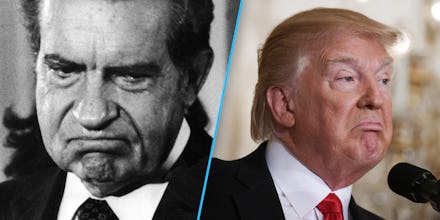What is the "madman theory"? Why people are talking about this Nixon-era foreign policy.

Of all the many reputations President Donald Trump has cultivated for himself — hawkish, bombastic, xenophobic, narcissistic — unpredictable is one of his most salient.
Richard Nixon, who was in power from 1969 to 1974, was also known for his unpredictable behavior. This shared trait is the basis of the so-called "madman theory," a foreign policy strategy coined by Nixon himself.
What is the madman theory?
The tactic involves having a consistently volatile leader to keep adversaries discombobulated, unable to guess what the United States will do next. The U.S.' opponents, the theory goes, will become circumspect out of fear that the worst could happen.
The mercurial leader must also be accompanied by a more experienced, even-keeled administration, preserving and encouraging international agreements.
Just as Nixon had an experienced national security adviser in Henry Kissinger, an established figure on Capitol Hill; Trump has Army Lt. Gen. H.R. McMaster, a revered three-star general who's been described as a "brilliant strategist."
"We must as a nation be more unpredictable," Trump said on the campaign trail in April, according to Bloomberg, laying the groundwork for a madman strategy. "We are totally predictable. We tell everything. We're sending troops? We tell them. We're sending something else? We have a news conference. We have to be unpredictable, and we have to be unpredictable starting now."
Trump has done good on his promise, disconcerting various global players. He rebuffed and then backtracked over the "one China" policy, which has been staunchly honored by the U.S. for four decades. On Monday, during a visit to Baghdad, Defense Secretary Jim Mattis publicly rejected Trump's controversial comments on seizing Iraqi oil.
Mattis, McMaster and other key figures in Trump's administration espouse traditionalism, in contrast to Trump's disruptive approach to foreign policy.
These traditionalists conform to the post-World War II world order, supporting "a mainstream foreign policy, especially in Europe and Asia, and avoiding the excesses of America First and religious war," Foreign Policy explained. "Their first priority will be to maintain America’s alliance system and military presence around the world."
Trump's apparent madman approach to foreign policy has some in the international community worried.
British general Sir Richard Barrons, former commander of the United Kingdom's Joint Forces Command, fears Trump’s approach is reckless — rather than calculated, like the "madman theory" would suggest.
At a recent meeting of the Association of European Journalists, Barrons was asked how he thought Trump's business expertise would play out in the geopolitical sphere. "I think badly," he answered.
"If Mr. Trump is confronted – given the nature of his approach to his life so far –he may respond in a way that is psychologically normal for him but deeply dangerous for the rest of us," he said.
Trump's erratic behavior is at risk of bringing about a war, Barrons added: "Wars generally start for really bad reasons and the red mist descends and you lose control. … I think the risk of that is evident."